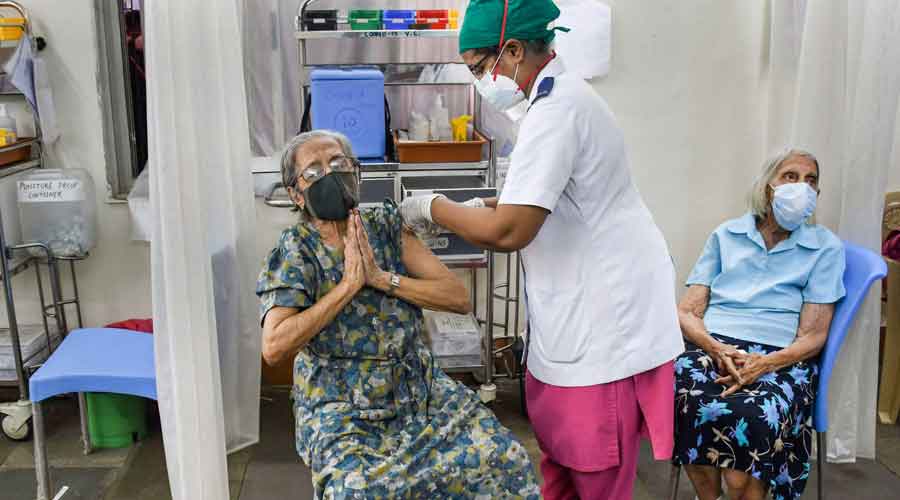
This is a time for intense scrutiny of strains: Experts- Union health ministry has asked each state to send 150 Covid-positive samples fortnightly for genome sequencing
Genome sequencing: Govt deviates from target set by national research consortium

The move has baffled many health researchers who say the new guidelines have lowered the genome-sequencing target at a time the emerging coronavirus variants need intense scrutiny.
The health ministry’s guidelines seek 15 samples each from five labs and five hospitals in every state every two weeks.
Some health and medical researchers are concerned that a uniform flow of 300 sequences a month from each state would not provide sufficient data to determine how the “variants of interest” might be affecting the patterns of infections or the epidemic there.
“The fewer samples we sequence, the less we know what the variants are exactly doing in India,” said a senior researcher in one of the 10 labs that make up the Indian National SARS-CoV-2 Genomics Consortium (Insacog), established by the Centre in January this year.
The 10 central government labs that make up the consortium have sequenced over 20,000 samples from across India and found that some variants are dominating certain geographic regions — one named B.1.617 in Maharashtra, for instance, and another called B.1.618 in Bengal.
The fast-spreading UK variant, B.1.117, appears to be dominating samples sequenced from Punjab, Delhi and Haryana; B.1.617 accounts for 35 to 40 per cent of the samples from Maharashtra; while B.1.618 makes up roughly 20 per cent of the samples in Bengal.
But efforts to draw inferences whether and how this growth in variants might be impacting infections or the disease itself require large-scale sequencing along with critical information about the patients from whom the samples were taken.
The original target of sequencing 5 per cent of positive samples would have required over 20,000 samples from Maharashtra and over 7,000 samples from Delhi sequenced over the past week.
“The new guidelines asking for 150 samples every fortnight from each state go against Insacog’s vision,” a senior scientist involved with the consortium told The Telegraph.
Health researchers are also worried about what one of them described as “either inadequate or invisible efforts” to connect the variants with the patterns of the epidemic in different states — primarily by correlating genome sequence data with patients’ data.
The health ministry’s National Centre for Disease Control (NCDC), New Delhi, the nodal lab for Insacog, also operates a nationwide disease surveillance network and is expected to maintain information about Covid-positive patients acquired from its state units.
But senior Insacog researchers say they have no information whether the NCDC has analysed the sequencing data in conjunction with the details of patients from whom the samples were taken to determine the possible impacts of the variants on the epidemic.
“What’s the purpose of even limited sequencing (if there is) little effort to correlate the variants with the patients’ data?” said an Insacog researcher.
“We should be periodically informing local governments about circulating variants and their implications, if any.”
Efforts to correlate the variants with patients’ data, scientists say, are intended to find out whether the variants are influencing transmission patterns or disease severity, whether they are causing re-infection, if any, and whether they’re causing infections in vaccinated people.
Queries sent by this newspaper to the health ministry and the NCDC seeking responses to the concerns among Insacog researchers have not elicited any response.
Health authorities in the UK had between October and December last year correlated variants with infection patterns in Britain to calculate the B.1.117’s increased transmissibility.
In India, the epidemic — measured by a seven-day average of daily new cases — has grown 20-fold in Maharashtra, 77-fold in Bengal and 174-fold in Delhi since mid-February.
“What role have the variants played? Shouldn’t the policy makers know this?” asked another researcher.
Two senior government health researchers who requested not to be named told this newspaper that whatever variants might be at play, the actions for the public remain the same — physical distancing, masking, avoiding crowds, and getting vaccinated.
One of the researchers said that such Covid-appropriate behaviour needed to be reinforced “rather than spreading an air of fear or panic”.
“Panic does not prevent infection, protective measures against SARS-CoV-2 do,” the researcher said, adding that panic “closes our mind to synthesising information”.
A senior Insacog researcher, however, said the states and the public could use variant-related information to protect themselves.
The states may use data on variants to bolster preparedness, the researcher said. After sequencing efforts revealed that the fast-spreading UK variant made up nearly 30 per cent of the samples in Kerala last week, the state government had initiated fresh action to add beds, procure oxygen and get people to use double masks.

0 Response to " This is a time for intense scrutiny of strains: Experts- Union health ministry has asked each state to send 150 Covid-positive samples fortnightly for genome sequencing"
Post a Comment
Kalimpong News is a non-profit online News of Kalimpong Press Club managed by KalimNews.
Please be decent while commenting and register yourself with your email id.
Note: only a member of this blog may post a comment.